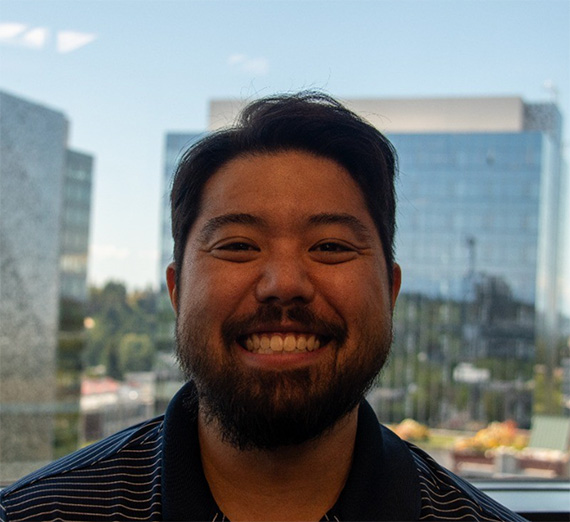Gonzaga’s Accelerated Master of Accountancy

For David Togami, there was no question he would pursue his Master of Accountancy (M.Acc) at Gonzaga.
“It was so easy as an undergrad to apply to the program, to be honest, and then another big reason were all my roommates were staying. It was really special to go from undergrad into grad school with the same roommates, same friend group that all just stayed for an extra year,” said Togami.
Togami took advantage of Gonzaga’s accelerated M.Acc option, allowing him to take masters level courses his senior year, and gained a new level of expertise in accounting.
“The undergrad program does a very good job of teaching you how to do things, how things are recorded, the debits and credits, how to build financial statements, how accounting kind of just works as a function of business. The grad program though, taught a lot of theory on why recording this way is what was chosen or what clarity it is supposed to give and really what is its purpose. So, it was very much a higher level of theory and complexity over a pretty complex subject matter.”
Togami continued, “The focus on theory and the why behind things has helped me become a better practitioner because it allowed me to get a really good grasp on the application of the discipline itself in different industries and in different overall processes,” said Togami.
The M.Acc program provides technical accounting skills as well as a deeper focus on the business of accounting and Togami pointed out he and his classmates gained additional tools they could use throughout their careers.
“The communication skills from the grad program were outrageously valuable to have. I remember Dr. Webber told us that accountants are inherently bad writers, so they focused on developing really good, clear, concise, written communication skills of their students,” said Togami.
Since graduating, Togami has worked in the aviation industry doing safety and operational audits where he deployed the risk-based methodology he learned in the M.Acc program. Togami is now back at an accounting firm where he works as a technical program manager, helping to implement and develop artificial intelligence and automation driven tools for auditors.
“I think the M.Acc program offers a lot of things on a theoretical and technical level that you just don't get out of other programs that are under the same moniker. I’m able to apply these skills to multiple business situations.”
“It was so easy as an undergrad to apply to the program, to be honest, and then another big reason were all my roommates were staying. It was really special to go from undergrad into grad school with the same roommates, same friend group that all just stayed for an extra year,” said Togami.
Togami took advantage of Gonzaga’s accelerated M.Acc option, allowing him to take masters level courses his senior year, and gained a new level of expertise in accounting.
“The undergrad program does a very good job of teaching you how to do things, how things are recorded, the debits and credits, how to build financial statements, how accounting kind of just works as a function of business. The grad program though, taught a lot of theory on why recording this way is what was chosen or what clarity it is supposed to give and really what is its purpose. So, it was very much a higher level of theory and complexity over a pretty complex subject matter.”
Togami continued, “The focus on theory and the why behind things has helped me become a better practitioner because it allowed me to get a really good grasp on the application of the discipline itself in different industries and in different overall processes,” said Togami.
The M.Acc program provides technical accounting skills as well as a deeper focus on the business of accounting and Togami pointed out he and his classmates gained additional tools they could use throughout their careers.
“The communication skills from the grad program were outrageously valuable to have. I remember Dr. Webber told us that accountants are inherently bad writers, so they focused on developing really good, clear, concise, written communication skills of their students,” said Togami.
Since graduating, Togami has worked in the aviation industry doing safety and operational audits where he deployed the risk-based methodology he learned in the M.Acc program. Togami is now back at an accounting firm where he works as a technical program manager, helping to implement and develop artificial intelligence and automation driven tools for auditors.
“I think the M.Acc program offers a lot of things on a theoretical and technical level that you just don't get out of other programs that are under the same moniker. I’m able to apply these skills to multiple business situations.”
